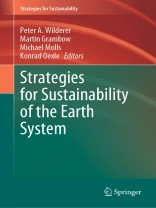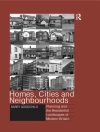This volume builds on an international workshop held in 2019, inspired by James Lovelock’s ‘The Revenge of Gaia – Why the Earth Is Fighting Back, and How We Can Still Save Humanity’. It, therefore, understands the Gaia concept as an umbrella term for the living world that planet Earth is hosting for nearly 4 billion years. Humankind has intervened in this ecosystem since its emergence on the planet about 2.5 million years ago, often with painful consequences for itself. In its reactions, the Earth system follows only the laws of nature. Consequently, humanity needs to develop strategies for a sustainable Earth system. This volume presents a unique trans- and interdisciplinary variety of approaches to this challenge, offering philosophical considerations as well as practical medical research. It addresses a broad knowledgeable and general audience in environmental management, public administration, and higher education alike.
विषयसूची
Foreword.- List of Content.- List of Contributors.- Message from the Desk of the Bavarian State Minister of Environment and Consumer Protection.- Editorial: A Journey through the Book.- Part I: General Thoughts.- Chapter 1. The Anthropocene Turns Out To Be A Disaster For The Earth. Few Options Remain To Change Course.- Chapter 2. The Systemic Risk Perspective: Social Perception of Uncertainty and Tipping Points.- Chapter 3. On Ecological Ethics.- Chapter 4. The Complexity Trap: Skepticism, Denialism and the Political Epistemology of Climate Science.- Chapter 5. Biodesign: Design and Medicine—A Philosophical Challenge.- Chapter 6. Vulnerability is a Talent in the Ecological Crisis.- Chapter 7. From Anthropocene to Artificial Intelligence? Challenges of Machine Learning for Science, Life, and Society.- Part II: Ecology: A Key Resource.- Chapter 8. The Key Resources Water, Soil and Intact Ecosystems: In Which World Do We Want To Live In The Future?.- Chapter 9. Natural Ecosystems and Earth´s Habitability: Attempting a Cross-Disciplinary Synthesis.- Chapter 10. Resilience Thinking: Push-Start of a New Enlightenment in the Light of the Sustainability Paradigm.- Chapter 11.- Is the Global Economy Running a Pyramid Scheme?.- Chapter 12. Climate Positive, Sustainable Agriculture is a Possible Cornerstone for Public-Interest-Agrarian Policies.- Chapter 13. Bavaria in Transition: Changes in the Water Balance due to Man And Nature.- Chapter 14. A Discussion of Basic Notions.- Part III: The Human Health Dimension.- Chapter 15. Genetics, Neurostimulation and Robotics: Implications for the Developing Child.- Chapter 16. The Smartphone. Digital Reverse Transcriptase of Child Development. The New Inner World of the Outer World of the Inner World. Chapter 17. Can Artificial Intelligence Improve Our Health?.- Chapter 18. Allergy and Civilization.- Chapter 19. Nutrition, Movement and Environment.- Chapter 20. The Future of Cancer Therapy with X-Rays: Patient numbers, Innovations, Clinical Trials and the Problem of Generating Evidence.- Chapter 21. Medicine and Senescense: An example of Earth by Medical Progress.- Chapter 22. Epigenetics won´t do Miracles: Some Sobering Remarks in Response to Prof. Johannes Huber.- Part IV: Towards a New Enlightenment.- Chapter 23. New Enlightenment towards Methodological Cosmopolitanism and Cosmopolitan Democracy.- Chapter 24. A Different Look to Consumption: From Quantitative to Sustainable Consumption.- Chapter 25. Public Health: A Political Toolbox to Reduce Violation of Earth.- Chapter 26. Enlightenment 2.0: Towards responsible science in the Anthropocene.- Chapter 27. Enlightenment 2.0? What we would have to Change if we Wanted to Stay.- Chapter 28. The Fridays for Future Phenomenon.- Chapter 29. Empowering the Earth system by technology: Using Thermodynamics of the Earth System to Illustrate a Possible Sustainable Future of the Planet.- Part V: Last but not Least.- Recommendations for Action.- Personal Message fromthe Authors.- Index.-
लेखक के बारे में
Martin Grambow studied civil engineering at the Technical University of Munich (TUM). He is currently head of the Water Management Department in the Bavarian Ministry of the Environment and Consumer Protection (Bay St MUV). His responsibilities include water laws and regulations, water monitoring and development, water supply and flood prevention. He represents Bavaria on national and international expert committees and heads the Danube River Basin Commission. Within the framework of a project entitled Technology Transfer Water (TTW), Professor Grambow encourages the use of German know-how in the field of water technology and water management in international projects around the world. He is Honorary Professor at TUM and teaches International Water Policy and Law, with a particular focus on the consequences of the Anthropocene for sustainable environmental policy.
Michael Molls was the chairholder and the director of the clinic for radiotherapy andradiation oncology at the Technical University of Munich (TUM) from 1992 to 2014. Further activities include his serving as a member of the Board of Management and the Supervisory Board at the TUM hospital “Rechts der Isar” and head of the Tumour Centre (Tumorzentrum) München of both Ludwig-Maximilians-University (LMU) and TUM. He was particularly committed to process, result and structure quality of interdisciplinary oncology. He currently serves as the scientific director of the TUM Institute for Advanced Study, where he fosters the integration of medical research and sustainability.
Konrad Oexle heads the Neurogenetic Systems Analysis group at the Institute of Neurogenomics, Helmholtz Center Munich, the German Research Center for Environmental Health. He also is associated with the Institute of Human Genetics at the Technical University of Munich (TUM) where he is Adjunct Professor (apl). After medical school at the University of Freiburg, Germany, anda postdoc at the University of California, US, he started his career in clinical medicine as pediatrician and human geneticist. He then turned to science where his biomedical research interests address genetic, epigenetic and environmental causes of sleep disorders and neurological diseases.
Peter A. Wilderer received in 1965 the degree of Doctor of Engineering (Dr.-Ing.) in sanitary engineering from the University of Karlsruhe, and in 1976, he qualified for professorship (habilitation) in field of bio-process engineering. He has been professor at the University of Karlsruhe, the Technical University of Hamburg-Harburg, and the Technical University of Munich (TUM) in Germany, and he served as visiting professor at the University of California at Davis, USA, the Montana State University, USA, and the University of Queensland, Australia. In 2003, he received from the hands of the Swedish King the Stockholm Water Prize. In 2007, the Technical University of Munich honoured him with the title “Professor emeritus of excellence”. In 2002, he founded the Institute of Advanced Studies on Sustainability of the European Academy of Sciences and Arts, today known as International Expert Group for the Preservation of the Earth System (IESP), an open network of scientists and researchers, entrepreneurs, politicians and members of governmental and non-governmental institutions.












